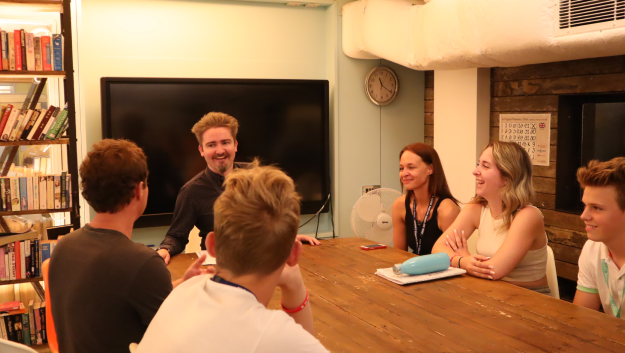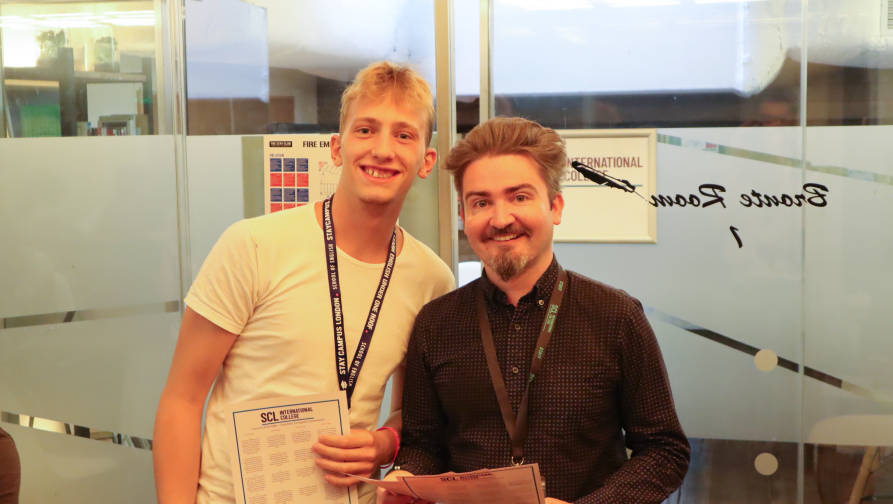
Categories: London Living
The New Year feels like a new beginning, so it's the perfect time to leave the "old you" behind, plan for a positive change and start off fresh. Many people will make New Year's resolutions to help them stay committed to their aspired transformation. Resolutions are promises we make to ourselves to improve our lives, and they can be powerful if we choose them wisely (to ensure they’re realistic) and reframe our expectations regularly (to keep us motivated).
Some good examples of New Year's resolutions can include saving money, getting fit, becoming more organised, travelling more, or improving your language skills. Naturally, we’d recommend learning English in London to achieve that last one!
Whatever goals you want to achieve in the year ahead, keep reading because we'll take a closer look at New Year's resolutions and see how they can be powerful tools for self-improvement.
New Year's resolutions can encourage you to try new things, give you a sense of direction, and help you grow and develop. They can also help you establish good habits and lift your overall well-being.
For example, if you enhance your English, you enable yourself to communicate with a broader range of people and boost your self-esteem and confidence. Fluency in English also opens up new career opportunities and allows you to travel to different parts of the world more easily.


We’ve asked our Kentish Town Academic team what they think about New Year’s resolutions and whether they can share some tips on how to keep them. This is what we've gathered from Paul, our Academic Coordinator:
Do you think New Year’s Resolutions are a good idea?
Can you share some tips on how to keep New Year’s resolutions?
Do you think it is too late to decide on a New Year’s resolution in February?
What are your New Year’s resolutions?
Resolutions offer time for reflection. Too often, we rush through daily life without slowing down to assess the impact of our actions. You can think of making resolutions as a four-part personal development system:
Such actions contribute to your happiness and fulfilment because you commit to strengthening your emotional and mental health when you move forward with a clear direction.
Why not get started now? Take a minute before you continue reading to write down one or two of the most significant goals you want to achieve in the year ahead.
The best New Year's resolutions should be important to you and align with your values and priorities. This way, your goals will motivate you.
In addition, your New Year's resolution should be specific, measurable, meaningful and relevant.
Finally, they should also be challenging but achievable because unrealistic New Year's Resolutions will be impossible to follow through, and you may end up frustrated. For example, if your goal is to "speak English fluently in three months," you may find it difficult to accomplish your objective because learning a new language takes time, patience and practice.
Here’s some helpful examples:
The second example from above shows you a practical, manageable way to fulfil your resolution over a period of time. Rather than making changes overnight or risk sliding back into bad habits after the first few weeks of the year, you can make little steps which will lead to bigger results in time.
Tip! Be sure to reward yourself for achieving your goals as the year progresses!
To help you achieve your language goals, we put together a few examples below of how you could improve your English by building up from little strategies to big rewards.

What better place than SCL International College? From Intensive General English programmes and exam preparation lessons to summer campus courses, we have something for everyone. You’ll mix and mingle with native English speakers and other international students all under one roof at any of our all-inclusive London campuses, and our friendly team of English language teachers and Student Services staff will be there to help you every step of the way.
As one of our recent students Jan explains in his story, "Denisa was taking good care of us. She was always available for a talk, or if I needed anything, I would speak to our teachers."
If improving your English language skills is one of your New Year’s resolutions, then we can support you on your journey to achieving your personal goals!
Now that you know why New Year’s resolutions are so important and how to create powerful ones, next let’s ensure you stick to them.
Have you heard of the acronym SMART? It stands for specific, measurable, achievable, relevant and time-bound. This acronym is used in business management techniques, and by setting SMART objectives, you will have a higher chance of making good progress towards your New Year's resolutions.
Specific: Instead of vaguely saying, "I want to speak English," you may want to say: "In three months, I want to be able to order food in the English language." It will be more effective for you to know when you want to achieve what.
Measurable: Remember to track your progress and celebrate every tiny achievement in your learning journey. Some examples are logging your progress into a journal, writing notes on a piece of paper and sticking it on a fridge, or making notes on your portable device - whatever you prefer.
Achievable: Start small instead of trying to make a significant, overwhelming change. If ordering food in English seems like a lot for you to accomplish, then break it into smaller goals. For example, start by focusing on different food-related vocabulary and test yourself by taking quizzes (and by eating those foods - learning should be fun after all, and this is a great reward!).
Relevant: Does this goal matter to you? You may want to study at a UK university or change your career path - find a goal that excites you. You will be more likely to follow through with your resolution if you believe the change will enrich your life and make it as fulfilling and meaningful as possible.
Time-bound: Give yourself enough time to accomplish your goal, celebrate small wins, and keep track of your gradual progress. Remember, if you are building a new habit, then you are planning a new lifestyle, so to use an analogy:
Don't be a sprinter; train for a marathon instead.
As you break your tasks into several manageable pieces and stick to your new routine, you will be able to notice improvements quickly and you will be one step closer to achieving your bigger goals.
Although you probably have lots of important goals and plans for the future, when it comes to New Year’s resolutions, we suggest you pick just one or two for each year. Focus your energy on one objective at a time rather than spreading yourself too thin amongst many various goals.
In case you have a long list of potential resolutions, pick the best ones for the year ahead and save the others for next year. Or who knows? Maybe now that you’ve seen our tips, you’ll accomplish your first resolutions quickly and you can start on the rest of the list later in the year!
Although keeping New Year's resolutions can sometimes be challenging, with the right mindset, clear planning and support, you can complete your objectives. If you skip a day or two, don't be hard on yourself. Instead, focus on getting back on track.
Need a helping hand? Give us a shout! Share your New Year's resolution with us at info@sclinternationalcollege.com or connect with us on our Instagram, tag us in your post, or send us a private message - we can't wait to hear what you are hoping to achieve in 2023!
Good luck with everything you do. We’re rooting for you!
Select from below to filter by category.
Subscribe now and get our monthly enewsletter with all our latest tips and guides.